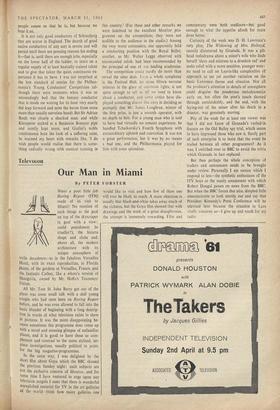Television
Our Man in Miami
By PETER FORSTER WHAT a poor little job Roving Report (ITN) made of its visit to Miami! No mention of such things as the gaol on top of the skyscraper (a gaol with a view.
could punishment be crueller?), the bizarre shops and clubs and, above all, the modern architecture with its unique atmosphere of virile decadence—as in the fabulous Versailles Hotel, with its exact reproduction, in Florida plants, of the gardens at Versailles, France, and the fantastic Cathay, like a whore's version of Shangri-la, owned by Mr. Hoffa's Teamsters' Union.
All Mr. Tom St. John Barry got out of the place was some small talk with a dull young couple- who had once been on Roving Report before, and he was even allowed to fall into the basic blunder of beginning with a long descrip- tion in words of what television exists to show in pictures. It was the more disappointing be- cause sometimes this programme does come up With a novel and amusing glimpse of unfamiliar Places, and it is good to have these as com- plement and contrast to the more stylised, set- Piece investigations, usually political in point, for the big magazine-programmes. In the same way, I was delighted by the short film about Goya which the BBC showed the previous Sunday night: such subjects are not the exclusive concern of Monitor, and for some time I have ventured to urge upon any television moguls I meet that there is wonderful unexploited material for TV in the art galleries of the world—think how many galleries one would like to visit and how few of them one will ever be likely to, reach. A main objection is usually that black-and-white takes away much of the richness, but the Goya film showed that with drawings and the work of a great draughtsman, the attempt is immensely rewarding. Film and commentary were both mediocre—but good enough to whet the appetite afresh for more done better.
Curiosity of the week was D. H. Lawrence's only play, The Widowing of Mrs. Holroyd, cannily disinterred by Granada. It was a pit- head melodrama about a miner's wife who finds herself 'slave and mistress to a drunken oaf' and seeks relief with a more sensitive, younger man: no need to call on Leavis-like complexities of approach to see yet another variation on the basic Lawrence theme and situation. Not all the producer's attention to details of atmosphere could disguise the ponderous melodramatics early on, but often the poet's touch showed through unmistakably, and the end, with the laying-out of the miner after his death in a disaster, was genuinely moving.
Pity of the week for at least one viewer was that I did not know of Granada's rushed-in feature on the Old Bailey spy trial, which seems to have impressed those who saw it. Surely part of such enterprise is to insist that the event be trailed between all other programmes? As it was, I switched over to BBC to avoid the trivia which Granada in fact replaced.
But then perhaps the whole conception of trailers and announcers needs to be brought under review. Personally I am unsure which I respond to less—the synthetic enthusiasm of the ITV boys or the manly amazement with which Robert Dougal passes on news from the BBC. But when the BBC forces that nice, dimpled little announcerette to look sternly out and say that President Kennedy's Press Conference will be televised later because the situation in Laos vitally concerns us—I give up and reach for my radio.


































 Previous page
Previous page